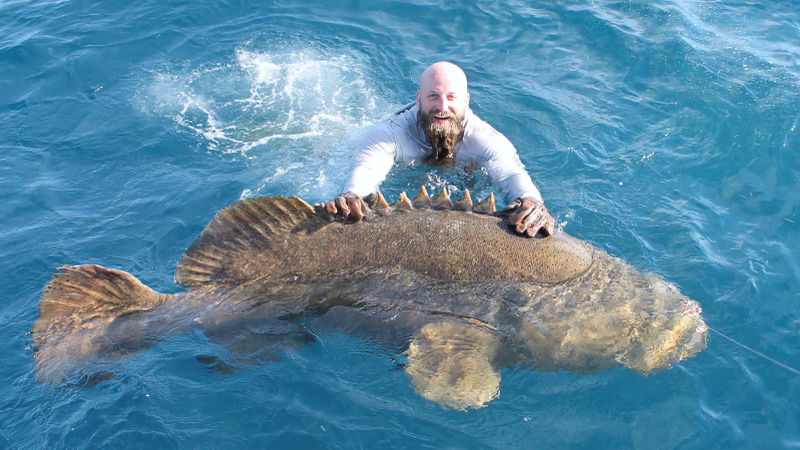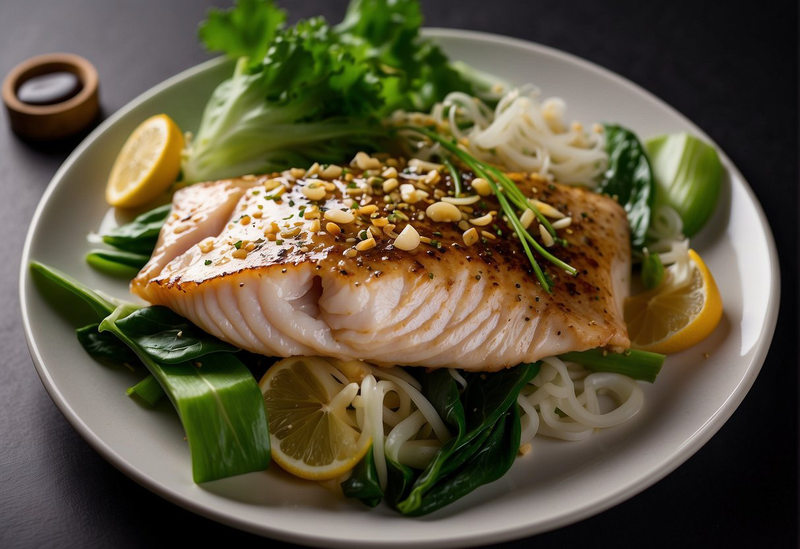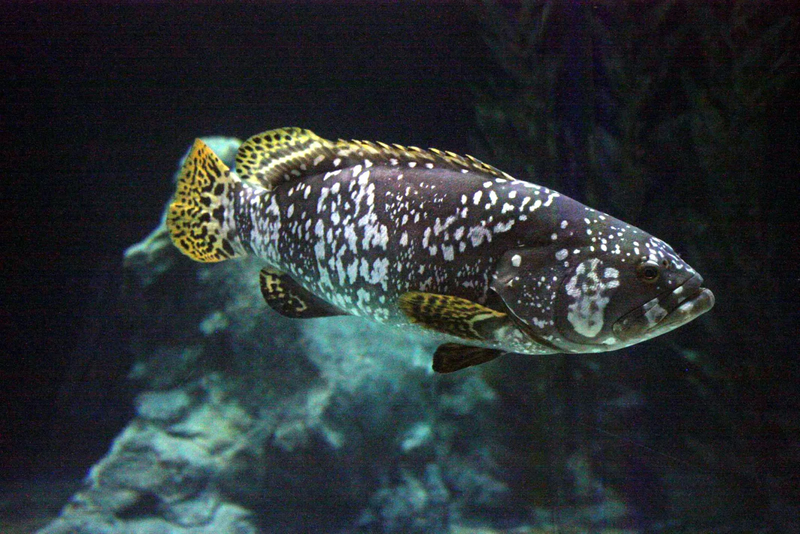Grouper is a marine fish with high economic value and rich in nutrients. With high protein content, Omega-3 and essential vitamins, grouper has become a favorite choice in many families’ meals.
Grouper is a fish that is always on the menu of restaurants, easily processed in many different ways, of which the most popular are grilled or fried. Grouper not only contributes to improving health, but also brings significant economic potential, becoming a sustainable source of income for many coastal communities. With the perfect combination of health benefits and commercial value, grouper is increasingly affirming its special position in both the culinary and aquaculture industries.
Characteristics of grouper
Grouper belongs to the Epinephelidae family, with many unique characteristics in biological behavior. Grouper has a long and slightly flattened body. The large head and pointed snout are easily recognizable features. The dorsal fin of the grouper often has hard spines and the caudal fin is rounded. Groupers have a wide variety of colors, from brown, gray, to black or with colorful spots and streaks.
The size of groupers varies quite a bit, from a few dozen centimeters to over 1 meter. Some can reach a weight of up to several dozen kilograms. Groupers are carnivorous fish and often hunt at night. Their favorite foods are small fish, shrimp, crabs, and squid. In particular, groupers are hermaphrodites, capable of changing sex from female to male during adulthood, which gives them an advantage in reproduction in the natural habitat. In addition, it is interesting that the growth time of groupers is slow, but their lifespan can be up to several decades.
Groupers also have good environmental tolerance, adapting to many different living conditions, from warm coastal waters to coral reefs. Natural distribution Grouper is widely present in many tropical and subtropical seas around the world, including Vietnam’s seas. The central and southern seas are home to many different types of grouper, creating favorable conditions for fishermen to exploit and develop the aquaculture industry.

Grouper can grow up to 1m in length.
Nutritional value of grouper
With high protein, vitamin and mineral content, grouper easily becomes a favorite dish of many people. However, red grouper is more popular because it has a sweeter taste than black grouper.
One of the outstanding nutritional values of grouper is its high protein content. This is a complete protein, providing all the essential amino acids that the body needs. Protein plays an important role in building and repairing tissues, strengthening the immune system, and supporting metabolism. In addition, high protein consumption also helps you feel full longer, thereby supporting weight control. Therefore, grouper becomes an ideal choice for those who are looking for a healthy nutritional solution.
Grouper contains a significant amount of Omega-3, a fatty acid that is beneficial for heart health. Omega-3 helps reduce bad cholesterol (LDL) and increase good cholesterol (HDL), thereby helping to reduce the risk of cardiovascular disease. Furthermore, Omega-3 is also extremely beneficial for the brain. Studies have shown that foods rich in Omega-3 can improve memory and nerve function. Therefore, including grouper in your daily diet not only brings physical but also mental benefits.
Grouper is also a rich source of vitamins and minerals. The content of B vitamins, vitamin D, vitamin E and vitamin A in grouper is very high. These vitamins not only help improve resistance but also support the body’s development. In addition, minerals such as calcium, iron, zinc, and magnesium are also found in grouper, helping to improve bone and joint health, enhance blood production and support the immune system.
In short, consuming grouper is not just about enjoying a delicious dish but also brings many benefits to human health. From maintaining heart health, improving memory, to protecting the eyes, grouper is truly a valuable source of nutrition that you should not ignore.

Grouper dishes have high nutritional content from protein, vitamins, minerals, unsaturated fatty acids,…
Economic value of grouper
Not only is it a nutritious food, grouper also contributes greatly to the Vietnamese economy through farming and exporting. Currently, grouper is widely farmed in many coastal provinces of Vietnam. The main method of farming grouper is in cages and ponds, depending on geographical conditions and market demand. Grouper farming brings high economic efficiency, contributing to the development of the local economy. People can earn a stable income from farming and consuming grouper.
Vietnamese grouper has been exported to many international markets such as the US, Japan, Korea and Europe. The quality of Vietnamese grouper has been highly appreciated and meets the needs of the global market. This not only contributes to enhancing the reputation of the Vietnamese seafood industry but also promotes the development of the national economy. The demand for grouper in the world market is increasing, opening up many opportunities for businesses in the field of seafood processing and exporting.

Grouper is a menu choice in many high-end restaurants.
How to choose fresh and delicious grouper
To ensure health and fully enjoy the flavor of grouper, knowing how to choose fresh and delicious fish is extremely necessary. You can apply the following method to other fish species.
- Observe the fish’s eyes: The fish’s eyes are one of the first factors you should pay attention to. Fresh grouper will have clear, shiny eyes and not cloudy or lethargic.
- Observe the fish’s gills: The fish’s gills are also an important factor in choosing fresh and delicious grouper. Fresh fish gills are often bright red and shiny, without a fishy smell. Do not choose fish with gray or dark gills.
- Touch the fish’s body: The elasticity of the fish’s body is also an important sign to determine freshness. When pressing your hand on the fish’s flesh, if it has good elasticity and quickly returns to its original shape, then it is fresh fish. Avoid fish with a soft, inelastic body and an unpleasant smell.
- Observe the fish scales: Fresh fish scales are usually shiny and tightly attached to the fish body, not peeling or discolored. If you see fish scales peeling or have an unattractive color, avoid buying them immediately.
Finally, you should buy fish from reputable places, with clear origins and ensuring food hygiene and safety. Avoid buying fish from places of unknown origin, which may contain preservatives, even antibiotic residues or mercury contamination, which will affect your health.

It is necessary to choose grouper with clear origin to ensure health.
So the above article has given you information about grouper: Health benefits and economic potential. Understanding the characteristics, nutritional value, economic value as well as how to choose fresh and delicious grouper will help protect your health and fully enjoy the special flavor. Hopefully this article has provided you with useful information about grouper cuisine.





